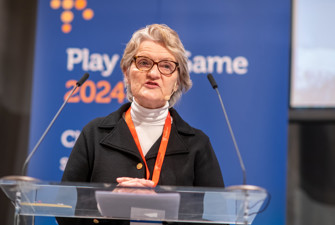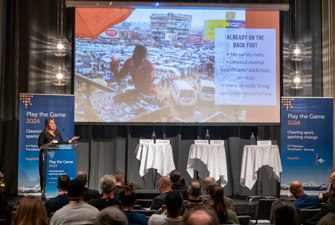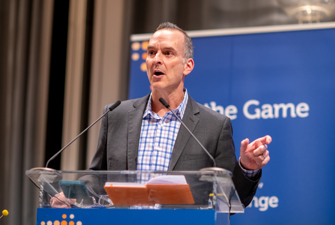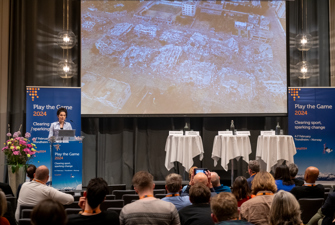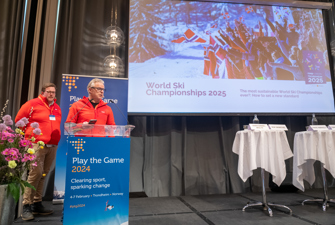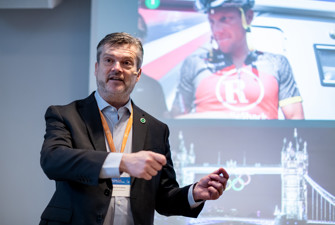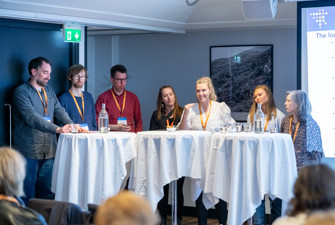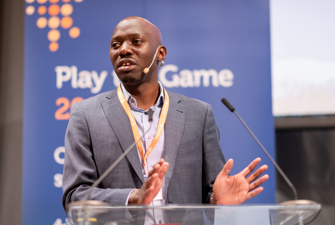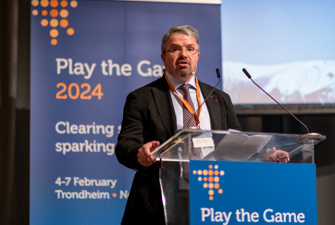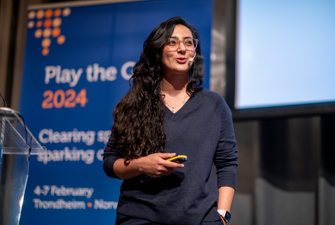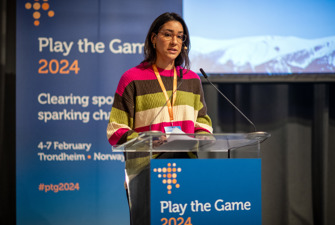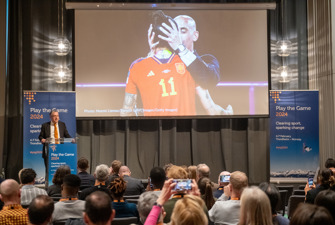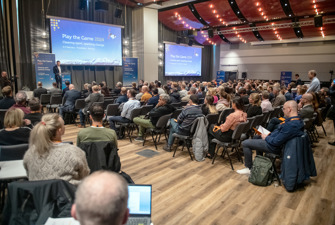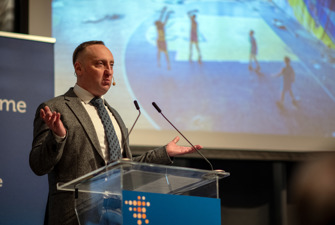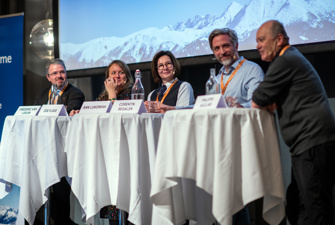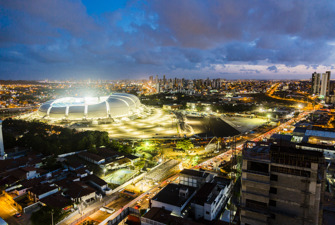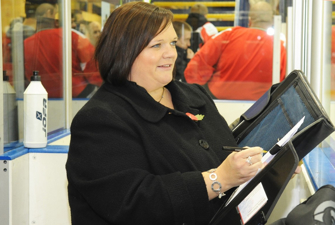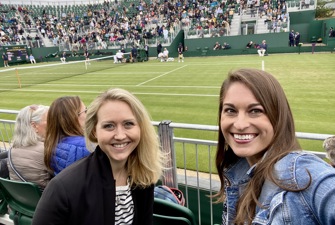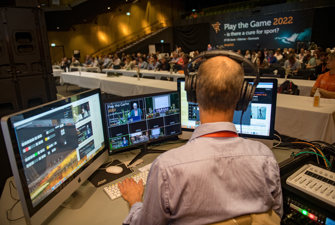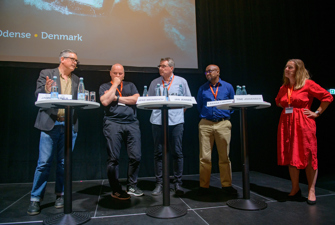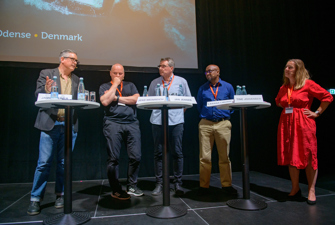From Qatar to Saudi: Soul-searching in sports reporting
COMMENT: After attending the 2024 Play the Game conference, it has become clear for journalists and activists alike, that Qatar’s continued success in the world of sports represents a juncture for contemplation and self-examination about our methodologies as we shift our focus to Saudi Arabia's hosting of the 2034 World Cup.
Comments on playthegame.org reflect the views of the author(s).
Fourteen months after the historic 2022 World Cup final, attention returned to Lusail Stadium in Doha as Qatar achieved a historic milestone by becoming the first country in 20 years to win consecutive Asian Cups.
The host nation earned a 3-1 victory against first-time finalists Jordan, with their star striker Akram Afif scoring a hat-trick of penalties to secure the win in an all-Arab AFC Asian Cup final.
Qatar’s Emir Sheikh Tamim bin Hamad Al Thani was in attendance during the match, after which he placed a black-and-gold bisht on the Qatar team’s captain — a tradition of sorts that began when the emir bestowed Lionel Messi with similar garments following the 2022 World Cup final — before handing him the glistening trophy as a ring of fireworks lit up the stadium.
For Qatar, it marked a storybook conclusion to a month of football that reaffirmed the Gulf state's position as the regional powerhouse in the sport. Moreover, it served as a reminder that Qatar's utilisation of soft power persisted beyond the culmination of the 2022 World Cup, signalling the commencement of a fresh chapter in its political ambitions.
However, for journalists and activists alike, it represents a juncture for contemplation and self-examination regarding our methodologies in reporting on autocratic regimes, the constraints of concepts like "sportswashing," and the essential adjustments required as we shift our focus to Saudi Arabia's hosting of the 2034 World Cup.
Qatar serves as a model for Saudi Arabia
In the years preceding the 2022 World Cup, mainstream coverage of the event often highlighted concerns about corruption and human rights violations, particularly Qatar's use of migrant labour for stadium construction and infrastructure development.
In 2014, the UK-based Sunday Times published an exposé based on leaked emails and documents, alleging that prominent Qatari football official Mohammed bin Hammam had paid substantial bribes to FIFA officials. Additionally, The Guardian reported in 2021 that over 6,500 migrant workers from various South Asian countries had died in Qatar since it won the bid to host the World Cup in 2010.
Qatar faced further criticism from human rights groups like Amnesty International and Human Rights Watch for laws that restricted the rights of LGBTQ individuals and women. Specific provisions in Qatar's penal code, criminalising same-sex relations, drew condemnation. Many of these organisations accused Qatar of "sportswashing," using sports events to improve its international reputation.
While much of the reporting on Qatar was fair and thorough, many journalists encountered allegations of bias and Western-centric perspectives. In certain instances, public relations agencies were directly commissioned to counter reporting on migrant workers in Qatar leading up to the World Cup.
Lars Haue-Pedersen, a managing director at Burton Cohn & Wolfe, was among those who addressed the Play the Game conference and discussed his endeavours to counterbalance negative portrayals of Qatar with positive narratives.
Qatar has continued to assert its influence after the World Cup
Contrary to expectations that Qatar's significance would wane post-tournament, the nation continued to assert its influence globally.
Notably, Qatar played a significant role in mediating negotiations between Israel and Hamas following the latter's attacks on southern Israel in October. Qatar's efforts resulted in the release of over 50 hostages and facilitated a humanitarian ceasefire lasting nearly a week.
The Gulf state has a history of playing a mediating role in international affairs. It has facilitated discussions between rival Palestinian factions Fatah and Hamas in 2006, assisted in bringing Lebanese leaders together to form a political agreement during the 2008 crisis, hosted a peace process for Sudan during the Darfur conflict, and facilitated talks between the Taliban and the U.S. in 2013.
Its current role amid the ongoing Israel-Hamas war has once again thrust the Arab nation into the spotlight.
Beyond its role as a mediator, Qatari officials also utilised soft power during the Asian Cup, especially when it came to presenting itself as an ally to the Palestinian cause. Palestinian flags and keffiyehs peppered the stadium while revenue from tournament ticket sales were reportedly donated to those impacted by the humanitarian crisis in Gaza.
“We will be certain that this corporate social responsibility initiative will benefit those most affected, and that football fulfils its role as a support mechanism for people during the most difficult of times,” said Hamad bin Khalifa Al Thani, a member of the ruling family and chairman of the AFC local organising committee.
Qatar’s ability to continue utilising football diplomacy despite the deluge of human rights abuses emphasises the limitations of holding autocrats to account in the current global landscape.
Nick Harris, editor of Sports Intelligence, argued at Play the Game 2024 that we only need to look at Qatar to know what to expect from Saudi Arabia in the run up to the football World Cup in 2034. Photo: Thomas Søndergaard / Play the Game
This subject was thoroughly explored during the Play the Game 2024 conference in Trondheim, Norway.
In a session dedicated to the 2022 World Cup in Qatar, Nick Harris, the editor of Sports Intelligence, initiated the discussion with an address delving into Qatar’s deception leading up to the tournament, including the corrupt methods employed by the Gulf state to secure the prestigious event. He also enumerated several instances where Qatar made commitments but failed to fulfill them after the tournament concluded.
Additionally, Harris highlighted how Qatar's tactics of obfuscation served as a model for other autocratic regimes like Saudi Arabia to emulate.
“Qatar wants to control the narrative and Saudi wants to do the same,” Harris concluded. “We can see the future; we just need to look at the past.”
Hosting the World Cup is the pinnacle of Saudi Arabia’s aspirations
On October 31, 2023, FIFA confirmed Saudi Arabia as the sole bidder for the 2034 World Cup.
The kingdom emerged as the winner in an expedited race to host football’s most prestigious tournament after Australia’s soccer federation announced that it would not bid for the tournament— a decision that was hailed as an “Arab victory” by other autocrats in the region.
The decision seemed inevitable. Over the past few years, Saudi Arabia has deployed sports as a means to project a favourable image of the country, as well as a tool for wielding political influence.
Billions have been spent on boxing events, Formula 1 races, a golf tour, and to lure some of the world’s top footballers to its domestic league. The kingdom has also secured more than 300 sponsorships across sports, furthering its leverage across the global industry.
Hosting the World Cup would represent the pinnacle of Saudi Arabia's aspirations in sports. While FIFA President Gianni Infantino seems eager to welcome the kingdom with open arms, there are ample reasons for apprehension regarding Saudi Arabia's impending prominence in global football.
Lina Alhathloul, head of monitoring and advocacy, ALQST for Human Rights, spoke at Play the Game 2024 about how Saudi citizens face mounting persecution in their home country. Photo: Thomas Søndergaard / Play the Game
Activist: Fear has become ubiquitous in Saudi Arabia
It remains unclear how the country’s human rights record will align with FIFA’s own guiding principles, especially when it comes to migrant rights.
Saudi Arabia recently unveiled designs for a hi-tech stadium perched on a cliff near Riyadh, which will serve as one of several new stadiums being built for the 2034 World Cup. Such infrastructure will require a consistent stream of migrant workers, many of whom will likely face serious abuses and exploitative conditions.
Saudi Arabia’s giant construction undertakings, including its Neon and Jeddah Central projects, have already resulted in mass evictions and forced displacement of indigenous tribes in the pursuit of Bin Salman’s ambitions.
Furthermore, Saudi human rights activist Lina Alhathloul argued during a plenary session at Play the Game 2024 that, despite claims of liberalisation and newfound societal freedoms, Saudi citizens continue to face mounting persecution.
“I want people to understand how fear has become ubiquitous here in Saudi Arabia,” Alhathloul said.
“The fact that the state security can really break into your house and take your daughter or your sister without you being able to know where they are, this is exactly the definition of a police state and this is what Saudi Arabia has become under Mohammed bin Salman.”
Given that we are likely to see human rights abuses take place on a far grander scale than in Qatar, can the international community hold Saudi Arabia accountable for its actions?
The answer remains elusive.
Advice to journalists and activists about Saudi Arabia 2034
During the Play the Game conference, acclaimed journalist and academic James M. Dorsey laid out a series of suggestions for how activists and the media should approach the 2034 World Cup to avoid some of the pitfalls faced in the coverage of Qatar 2022.
Dorsey proposed that the key to penetrating Saudi defences may lie in identifying potential areas of interest where Saudi Arabia may be open to change. He emphasised that labour rights could serve as the primary avenue, provided they are presented as suggested reforms rather than solely as a human rights concern.
Furthermore, Dorsey suggested that activists could employ "creative packaging" to attract Saudi authorities to their proposals, reserving the strategy of "naming and shaming" as a last resort.
“The fact of the matter is that all judicial arguments in favour of the value and respect for human rights are considerations that have no meaning for Mohammed bin Salman,“ he said.
Beyond Dorsey’s suggestions, I would suggest that media outlets also consider diversifying their newsrooms to encompass local perspectives from individuals with deep insights into the region. While this doesn't imply that coverage of the Middle East should exclusively involve individuals from the area, incorporating a wider range of voices would enhance reporting by providing crucial context and perspective.
This approach would be especially advantageous when addressing issues related to LGBTQ+ rights and women’s rights. These topics should not be solely examined through a Western perspective, as this approach can alienate readers and diminish the effectiveness of the reporting.
Instead, journalists should amplify the voices of women and queer individuals from the region, whose experiences offer invaluable insights and enrich our understanding of these issues far beyond what we typically cover. Consider Lina Alhathloul and how her devastating personal experiences can offer invaluable insight into life in modern Saudi Arabia.
Moreover, it is crucial for journalists to invest time in understanding the history, cultural customs, and geopolitical dynamics of the countries and regions they aim to cover.
Saudi Arabia is not isolated from its surroundings, nor does it solely exist within the framework of its interactions with the Western world. Similar oversights were evident in past reporting on Qatar, highlighting the necessity to avoid repeating such errors and instead strive to learn from past experiences.
Saudi is not sportswashing but looking for power and prestige
When exploring fresh methodologies for addressing autocratic regimes and their engagement in sports, it is also imperative for us to transcend simplistic terms like "sportswashing," as they provide only a narrow perspective on the myriad motivations behind the way regimes exploit mega-events.
The portrayal by mainstream media of Qatar's choice to host the 2022 World Cup as a mere diversion from human rights abuses was, at best, lacking in depth and, at worst, fundamentally flawed. While reputation laundering and brand management made up a small portion of Qatar’s aspirations, its true interest lay in expanding its regional and global influence.
In the years leading up to the World Cup, Qatar was facing a diplomatic crisis after Saudi Arabia, the United Arab Emirates, Bahrain, and Egypt initiated a de facto blockade and severed their bilateral relations with the state between 2017-2021.
After years of political jousting, tensions began to thaw in January 2021 when Qatar and Saudi agreed to restore relations. Egypt followed suit shortly thereafter while the UAE fully restored ties in 2023.
In addition to various other factors, the Arab nations anticipated substantial benefits from having a World Cup in their vicinity and were reluctant to forgo the economic advantages and tourism opportunities it would bring. Consequently, Qatar was able to utilise its position as the host of the World Cup to help reconcile relationships with its Arab neighbors.
This example of sports diplomacy is frequently disregarded as one of the benefits Qatar accrued from hosting the event. It also underscores the constraints of characterising Qatar’s World Cup solely as sportswashing.
In my own speech delivered at the Play the Game conference, I spoke about the diminished role of sportswashing in Saudi Arabia’s political agenda. Using my New York Times investigation that uncovered Messi’s contractual relationship with Saudi Arabia’s tourism authority as a launch point, I argued that sportswashing is no longer a relevant term when addressing the kingdom’s multi-pronged sports aspirations.
Instead, I suggested a more nuanced soft power analysis that incorporates geopolitical interests, domestic policies, and historical context.
“Over the past few years, I have argued that Saudi’s strategic investments were part of a complex political agenda to expand the kingdom’s global image, assert regional supremacy, especially with its rival the UAE, and create a bubble of patriotic distraction to occupy its young population — the modern day equivalent to Rome’s bread and circuses,” I said at the time.
By engaging in self-reflection and introspection into our collective coverage of Qatar 2022, including an over-reliance on the sportswashing connotation, we can move forward with a better chance of challenging Saudi Arabia’s mounting influence.
As I concluded in my speech: “We also have to understand Saudi’s political intentions and where sports fall into their ambitions. Messi’s contract shows us that Saudi Arabia is looking for more than reputation laundering.”
“It is looking for power, prestige, and an insatiable desire to control the global narrative.”






